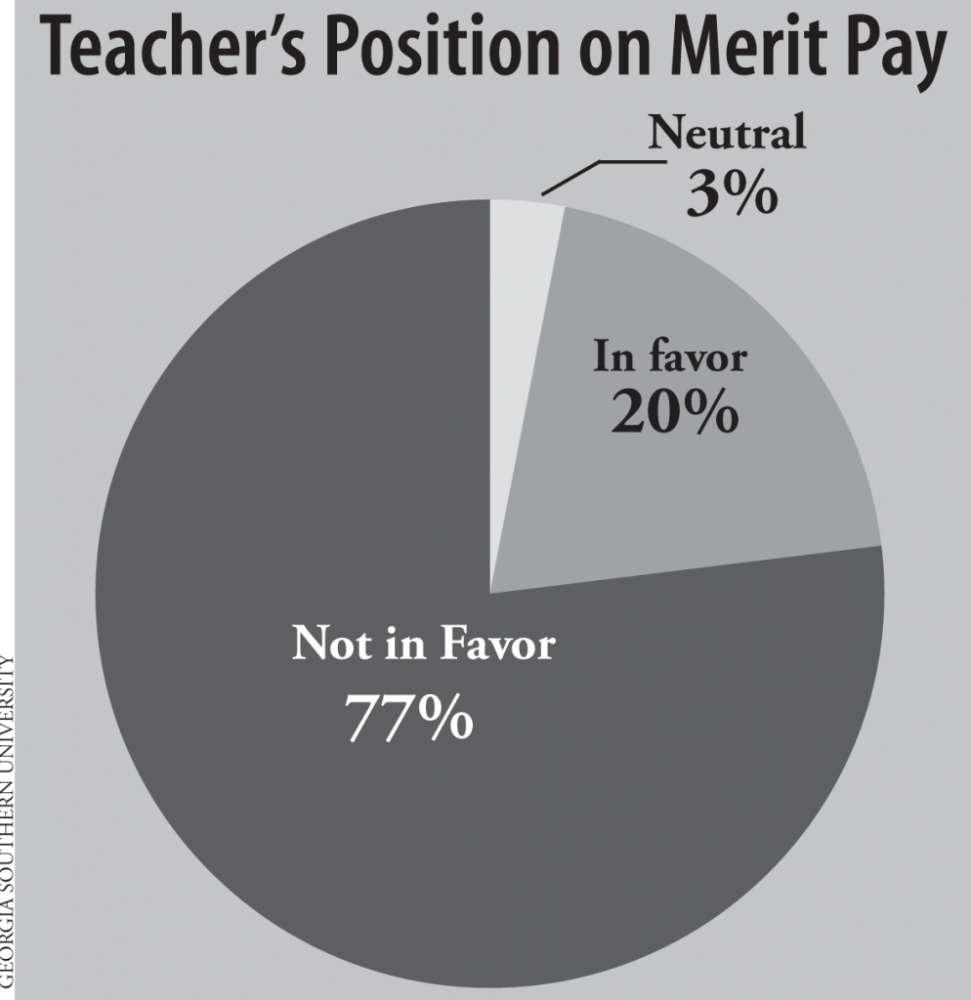Gov. Nathan Deal introduced a broad merit pay system for Georgia teachers to replace the current seniority-based salary system. According to Deal, the new system will help increase teacher accountability and will encourage educators to take on their job with greater inventiveness.
Deal announced his support of merit pay after the Education Reform Commission put forth a list of suggestions to overhaul the payment system for teachers, stressing to evaluate performance as a determining factor. Teacher unions argue the proposed change will hurt both teachers and students.
Under the new system, teacher salaries could potentially be determined by student performance on standardized tests. Deal’s proposal is designed to reward teachers who are meeting all the curriculum standards with higher pay, however, many educators feel that such a system would harm the dynamic of teaching by placing too much emphasis on tests which may not accurately portray the true capability of students.
Merit pay, however, is not necessarily limited to standardized tests and can take into account other factors of teacher performance. Recently at the annual State of the State address, Deal explained that his proposal could take a variety of forms depending on the district or school.
“Merit pay is a really broad term,” said Margaret Ciccarelli, a member of the Professional Association of Georgia Educators (PAGE). “It could mean something that we are very opposed to, which is paying teachers based on standardized test scores of students … or it can be paying teachers for extra duties they take on, leadership roles like coaching, managing new teachers, or student teachers, getting paid for advanced degrees or getting extra pay to go to a high poverty school.”
paying teachers for extra duties they take on, leadership roles like coaching, managing new teachers, or student teachers, getting paid for advanced degrees or getting extra pay to go to a high poverty school.”
Deal will use the upcoming year to further evaluate aspects of the proposal and to softly test the system before it potentially replaces the existing one.
“We have a long time to look at some things, [such as] the funding to see what does this look like for our schools,” State Superintendent of Education Richard Woods said at the 6th Annual APS Legislative Reception. “The governor is giving us that time to be very prudent in what we’re looking at, and in the days to come, we’ll make that announcement a little bit firmer.”
The concerns of the new proposal arose when the Education Reform Commission was given the charge of rewriting the schools’ funding formula. The commission debated over mechanisms to reform teacher pay and stressed transitioning to a system based on performance instead of compensation. Teachers do not think the commission has adequately reflected their concerns.
“[The commissions] were charged with re-writing school funding formula, and part of that re-write was also to revise the ways that teachers are paid, and one of our criticisms of the work of the commission is that there was not one classroom teacher appointed to the commission by the governor,” Ciccarelli said. “It’s important to listen to their voice, especially when you are talking about reforming teacher pay.”
Cynthia Briscoe Brown, an at-large member of the state school board, said she has heard the concerns of teachers and plans to take them into account.
“My understanding of their concerns is that they want to make sure that their performance is fairly judged, that the measures are accurate, fair, and are reasonably applied, and that they take into account all of the great things that teachers do for our kids every day,” Brown said.
Brown believes teacher performance should be evaluated holistically and that a merit pay system may not take into account crucial factors that contribute to the quality of a teacher. For example, a merit pay system based on absolute score instead of growth would disadvantage teachers who work with lower-performing students. Teachers would be paid less when their students had a greater gap to cover in the first place.
“We try very hard to assess our teachers’ performance by looking at the whole teacher, just as we look at the whole child, and so we try to take into account growth in the classroom,” Brown said. “We try to take into account as many additional factors as we possibly can.”
English teacher Lisa Willoughby believes that regardless of the specific form the merit pay program takes, the desire to quantify teacher performance is misguided.
“I think that merit pay is an attempt to apply business models to something that isn’t a business,” teacher Willoughby said. “I think that good teaching is really hard to evaluate, and that’s why there’s so many different mechanisms, but it’s not really a measurable thing in the way that politicians want it to be.”
Teachers also worry the merit pay proposal redirects focus and energy to teachers instead of students.
“I think that it shifts the burden of responsibility for learning too heavily towards the deliverer and not the customer,” teacher Sarah Looman said. “Merit pay removes any responsibility for learning the material from the student.”
Moreover, some fear that this could cause some teachers to lose sight of the academic needs of students and potentially compromise their integrity in order to boost their pay.
“The kind of pressure-cooker environment that we’ve created where students must succeed on the tests created an environment that was ripe for abuse, and that’s certainly what has happened in some instances,” Ciccarelli said.







